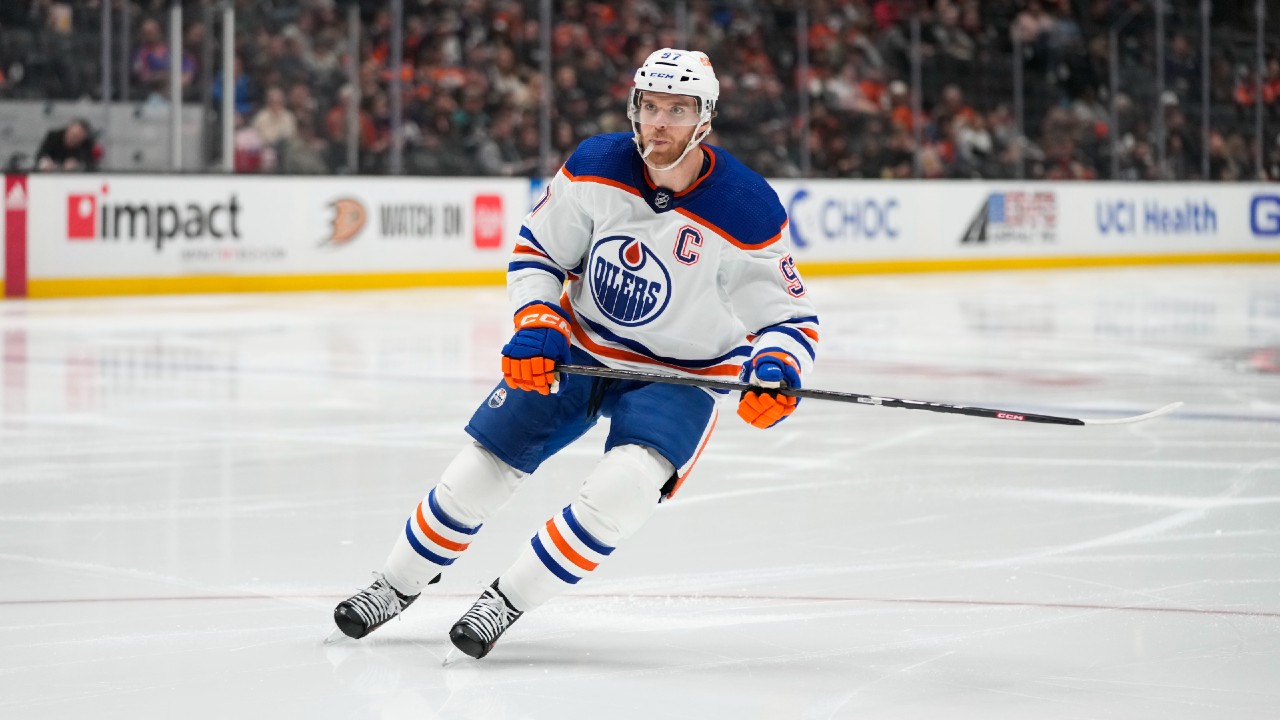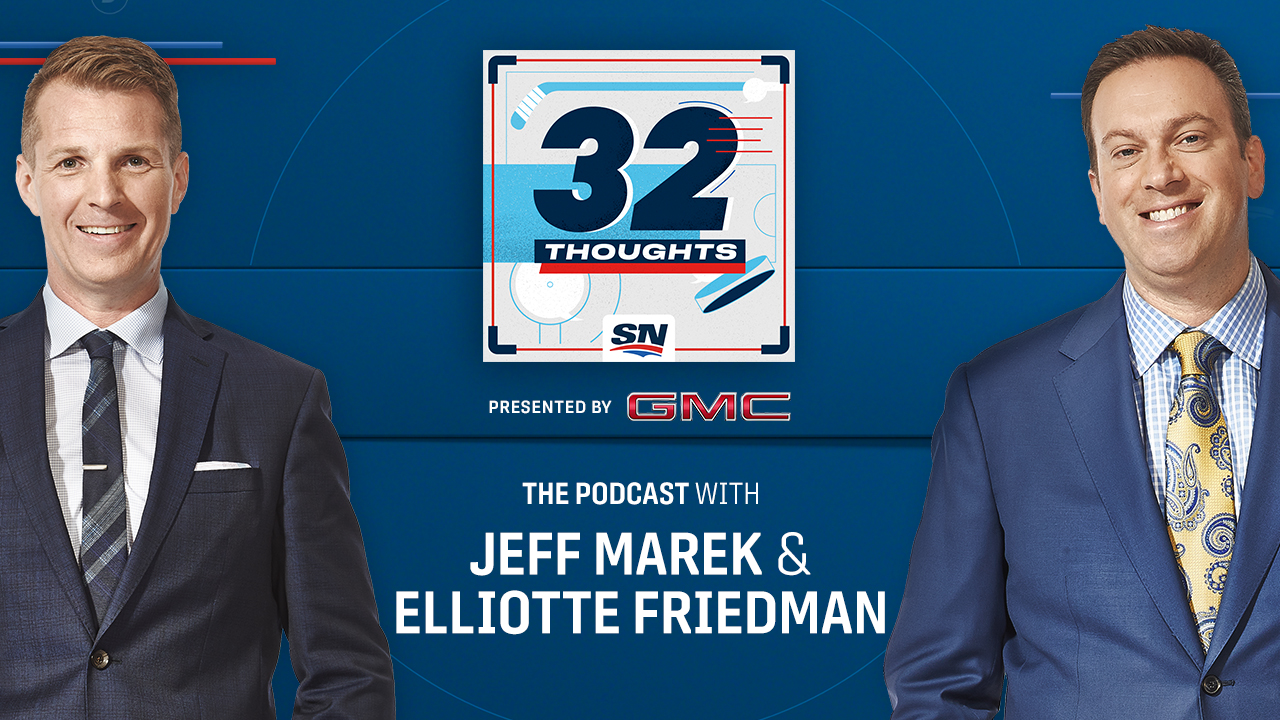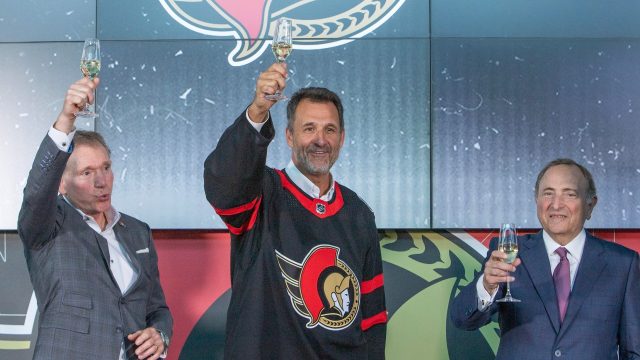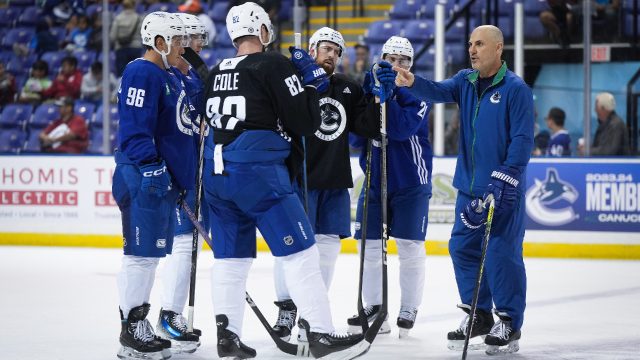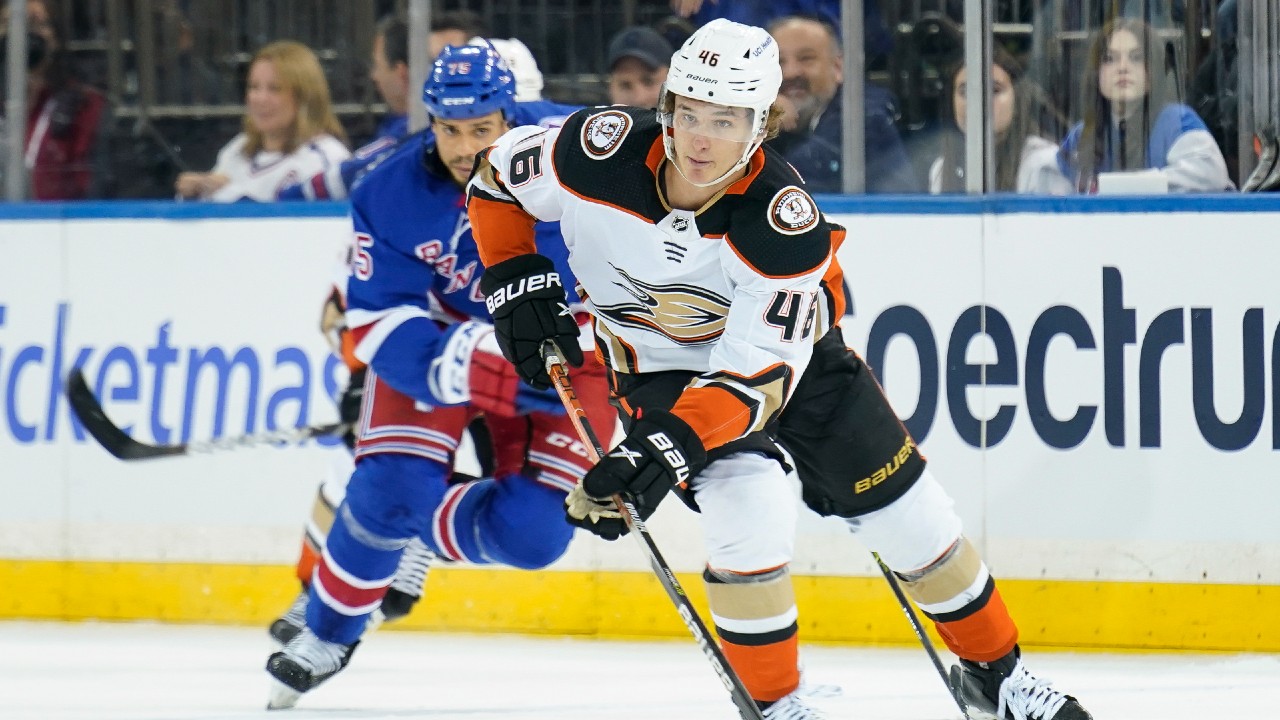
• What the Flyers are trying to get from the Senators
• Can Devon Toews and the Avalanche find common ground?
• How Luc Robitaille wants to show hockey to the world
Last week, Jay Wells looked at his phone and saw a text from good friend Peter Crosby.
“Hey. I hear you’re a superstar, you have to watch this,” it read. “This,” is Winning Time, the excellent HBO series about the 1980s Los Angeles Lakers.
Wells, a tough defenceman who retired in 1997 after 1,098 NHL games and a Stanley Cup with the New York Rangers, is featured during one scene of the now-cancelled series’ final episode. In 1984, a Lakers executive is furious that, during “a salary freeze,” she’s being asked “to sign off on a 20 per cent raise for some (bleeping) hockey goon I’ve never heard of!” She is told, “Somehow, he found out what the other guys were being paid.”
(Remember: NHL salary disclosure didn’t happen until 1989.)
At the time, Dr. Jerry Buss owned both the Kings and the Lakers. The executive, Claire Rothman, a powerful figure in the Lakers Empire, storms into Jeanie Buss’s office. Jeanie, Jerry’s daughter, who would become a powerhouse of her own, was 22 at the time. And in her office was Jay Wells.
The conversation goes like this:
Jeannie: Claire, have you met Jay?
Jay: Hi.
Claire: Yes, Kings defenceman Jay Wells. Let me be first to congratulate you on your new deal.
Jay: Thanks.
Claire: Now, get out.
Jay: Ah, cool.
Then he leaves as the two women reach an understanding.
“I don’t think I’ve ever used the word ‘cool’ before,” Wells said this week, laughing. “I live a pretty quiet life. It’s the way I like it. But those were good times, great memories. It’s nice to be mentioned.”
Former Kings teammate Phil Sykes reached out, while daughter Stephanie found the clip to share among family and friends. Wells and wife Colleen have been married 35 years. They have three daughters: Stephanie, Alexa and Kendra.
“My family laughed at it, thought it was hilarious,” Wells said. “My daughters thought it was pretty cool to have their dad in a TV series.” (We joked about “cool” becoming a regular part of his vocabulary, since it’s associated with him in this episode.)
The depiction of Wells is a little harsh. Yes, he did his fighting, but he did have 11 goals and 42 points in 1985-86. (Sportsnet’s Garry Galley is a fan, saying Wells “looked out for him” during Galley’s rookie year of 1984-85.) He and Buss dated “on-and-off” for a few years.
Wells said it’s true he asked Jeanie Buss how much other players made, but added he thinks (remember, it’s been 40 years) that it wasn’t a factor in negotiations. He remembers his contract being signed in 1983, during a very different era where Alan Eagleson basically told players what they’d be making. By 1986, when he did his next deal, players were more honest about their salaries to help each other.
Wells, however, did confirm two hilarious stories Buss wrote in her autobiography, “Laker Girl.”
“I know which one you’re going to ask first,” he said, laughing.
Buss says she met Wells after the first hockey game she ever attended, a shutout of the Boston Bruins. That corresponds with Feb. 20, 1980 — a 3-0 win, featuring six points from the Triple Crown Line of Marcel Dionne, Charlie Simmer and Dave Taylor.
Buss told Wells she went to USC, which Wells thought meant “United States College.”
“What a little country hick I was,” Wells said. “She roared. She thought it was hilarious.”
“I was hooked right then,” Buss wrote in her book. “My world was so small and I thought it was the centre of the universe. Here’s this Canadian kid, 20 years old, and he’s never even heard of USC.”
The second story involved their first date. This is another antiquated one, but, on the day they were supposed to go out, Wells received his “rookie shave” from the Kings’ veterans.
“We were going to the Laker game that night. My hair was parted down the middle, and the players only shaved one side, to the left. There was no way I was going to see her like that, so I went to a barber to get the other side shaved.”
Wells also showed up in a “beet red” Kingston Canadiens’ suit jacket from his Ontario junior days.
“I stood out like a sore thumb,” he said, laughing. “The whole Buss family was there. They didn’t say one word to me the whole game. After, we go into the lounge. I asked her, ’Did I say or do something wrong?’”
Buss wondered if he was a Hare Krishna. Wells had to explain old-time hockey initiations.
“It was such a different world than the one I had inhabited my whole life,” she wrote.
Jerry Buss bought Pickfair, a famous Hollywood estate that was once the home of actors Douglas Fairbanks Jr. and Mary Pickford. Wells lived there one summer, but he said he didn’t see much of the Dr. Buss as portrayed in the show, although he did joke that when Buss sat next to the Kings bench, players would be focused on his dates.
“I enjoyed being around him, he was pretty classy in the way he treated me,” Wells said.
To this day, Wells and Buss occasionally keep in touch. Tuesday is her 62nd birthday, and he usually sends best wishes. The Wells’ youngest daughter, Kendra, is a Canadian National rower and Buss has supported her on that journey.
If you’ve followed Jeanie Buss’s career, you know she’s a formidable force. She’s now the Lakers’ owner and president.
“(When I think of her, I think of) persistence,” Wells said. “She really wanted to run the Lakers, to take over from her dad. She went to school, studied business, everything she possibly could, ran other sports teams. The persistence of never giving up, living her dream. There were times she was disappointed, but she never quit. An astute person of the game.”
Wells said he’s watching the rest of the series now, and “the actors do a good job.” He’s right. It’s a shame it was cancelled. Excellent entertainment.
THOUGHTS
1. RFAs: Doesn’t sound like much movement in Anaheim. TVA’s Renaud Lavoie reported last week that the Ducks were offering Trevor Zegras between $3 million and $4 million per season. There was a time both sides seemed to agree three years was the proper term, and if that’s the case, it has to be higher. Zegras will be arbitration-eligible by then, and it confounds logic to be below $4 million. I’m not convinced there’s a term agreement with Jamie Drysdale yet.
2. The good thing for Ottawa is Philadelphia likes Mathieu Joseph as a player. They see a fit. The bad news is that it doesn’t mean the Flyers will make it easy. They’ve got the leverage and aren’t afraid to use it. They want a high-level prospect or maybe the first-rounder sent by Detroit in the Alex DeBrincat trade. To this point, Ottawa’s not willing to do that. It’s a poker game. San Jose is another team I’ve wondered about.
3. My prediction on Mikael Backlund: he signs in the neighbourhood of three years at a $5.5 million AAV. We will see how accurate I am. It’s always a grind to get there, but there is a will on both sides.
4. Devon Toews recognizes he’s not going to get top, top, top dollar in Colorado. But I think he’s OK with that, providing both he and the Avalanche find an agreeable figure. Everyone here is on lockdown, but the best intel is that talks continue. Toews indicated that if things were not progressing by the start of the season, he would shut down conversations.
5. Two other extensions that make sense: Jalen Chatfield in Carolina and Anthony Duclair in San Jose. Chatfield has found a niche with the Hurricanes, who have only three defencemen — Brent Burns, Dmitry Orlov and Jaccob Slavin — signed next season. The Sharks have only seven forwards signed for 2024-25, and would be a perfect home for Duclair. San Jose also has Logan Couture’s injury looming over the start of the season. Head coach David Quinn indicated it could knock out the captain for a bit.
6. Ethan Bear is skating in Kelowna, B.C. There is interest, but he’s not likely to be ready until around Christmas from the shoulder injury suffered at the World Championships. The good news for Bear is he doesn’t need to rush. Agent Jason Davidson secured an insurance package that pays him on a $3 million basis this season while out. He can get healthy and then sign somewhere.
7. Remember: never jump to conclusions during the first week of pre-season play. Even if your team loses 10-0. It’s waaaaaaaay too early.
8. That said, it’s interesting Rick Tocchet demoted Dakota Joshua to the non-NHL group after the ugly loss in Calgary. Tocchet liked the energy Joshua brought last season, pointing it out several times. “He has to try to win a job,” the coach told Vancouver reporters on Tuesday. “The job is not there. There are guys breathing down his neck for that one job.” Because Tocchet likes Joshua, that will not go unnoticed among the players. He is making sure the Canucks know there is no room for a bad start.
9. Ottawa played Thomas Chabot and Jakob Chychrun on the road, against a pretty good Toronto lineup on Monday night. Head coach D.J. Smith made it very clear that he needs to know quickly if he can depend on this duo. He threw them out there against Tyler Bertuzzi-Mitch Marner-Auston Matthews, and they did pretty well. Both are lefties, and Chabot played on his weak side.
10. Senators fans loved new owner Mike Andlauer’s introduction on Friday. He definitely hit the right notes, but also showed he can be politely blunt. When it comes to a new arena, the easy thing to do — and we’ve all seen it many, many times — is say, “Yes, we’re going to get it done!” No controversy on the first day. Instead, Andlauer made it very clear that it has to make sense, meaning the various governments will be expected to play ball. My father worked in the development business for a long time, and it’s a tricky, tricky dance. During an interview with CBC’s Ottawa Morning on Monday, Andlauer referenced the magnificent Rogers Place in Edmonton. Oilers owner Daryl Katz paid about 25 per cent of the costs.
11. As Los Angeles and Arizona return from Australia, Kings president Luc Robitaille hit what is now the league-wide rallying cry for future international play: make sure you leave a legacy. “What’s important is to go back,” he said. “You’ve got to make sure you go back, emphasize the broadcasting and (see) if we can have some more games here. At the same time, you get involved with the people.”
Robitaille said the Kings have discussed ways of making sure their brand gets a foothold in the country, whether it’s through tourism companies or jersey collaborations with Australian Football League teams. “We’ve got to make sure we don’t just come in, play two games, leave and don’t get involved again. More important is continuity.”
When the NHL went to China a few years ago, players complained they didn’t really do much “getting out there.” The Kings were one of those teams. Robitaille agreed, but said this was better. “I would say, every day we’ve had something where players were involved … there’s definitely been a lot more activation. I think what made it hard last time in China was we played in two different cities. And when you do that, it’s hard because there was travelling between Shanghai and Beijing.” That’s a two-and-half-hour flight. “This time around, we are here in one city. We spend six, seven, eight days in one town, and I think that’s the biggest difference.”
12. One city Robitaille would like to see the NHL return to is London. The Kings and Ducks went there in 2007, splitting two games. He thought that trip was successful. “I’m not going to tell you London’s a mecca of hockey, but we never went back, and I still do believe it’s important to go back, because it is the main city,” Robitaille said. “It’s like New York or Toronto, those are the cities, when you go and you have success there, you have to keep going. The other leagues have gone there and they keep going back. I do think it’s important, if we have an opportunity in the future, to go back there. It can make a big difference. Everyone in Europe seems to gather in London.”
The NFL has played a game in London every year since 2007 (except for the pandemic season in 2020), and now plays at least three per season there. That’s continuity, and Robitaille repeatedly hammered the theme in our interview. He also supports a February World Cup.
“When you’re trying to do a World Cup in September, everyone in Canada loves it and really enjoys watching it. But everyone (else) around the world, it’s really hard,” he said, referring to too many events worldwide. “In February, there’s a pocket, a big hole. If you build it over two, three tournaments — it doesn’t happen overnight — I really believe this could be a big difference-maker for hockey.”
13. Robitaille has done a lot of work and a lot of learning on the business side since he retired. What does he see as some of the biggest changes? “The biggest change we’ve seen is, obviously, the business has grown tremendously,” he answered. “The biggest thing coming up is going to be the local broadcasting. No one seems to know exactly the route it’s going to go. It’s going to go direct-to-consumer; we’ve got to make sure it’s done right. It’s going to be a lot of work behind the scenes in the next five-seven years. … Make sure hockey is going to be accessible for anyone who wants to watch it.”
He quotes a stat that every new player brings in 3.2 new fans, that you have to keep pushing every team to do as much as possible to grow the game. One thing I’m hearing more and more is concern about the growth of MLS, and whether that will hurt hockey.
“I don’t worry about it,” Robitaille said. “I always think, ‘What can we do to keep growing what we’re doing?’ Don’t look (at who’s coming in the rear-view) mirror, you look in the front to who you can catch, instead. It’s up to us to make a difference and keep promoting the game and keep doing things a little bit out of the ordinary. You look at what Vegas has done, even part of their in-game entertainment. It’s so different, everybody wants to see it now. They’ve definitely pushed the boundaries, and it’s going to force everyone to get better. … Little things like that is the way you get better as a league.”
14. Someone once mentioned to me that Robitaille would make a perfect commissioner. He laughed off that suggestion. “No, it’s way too much work.”
15. Finally on Robitaille, a Twitter follower (sorry I couldn’t find who) sent a note that he once got three penalties on the same play. It’s true, it happened Nov. 12, 1992 during a 7-4 home win over Vancouver. At 12:21 of the first period, he received minor penalties for charging, holding the stick and roughing. What on Earth happened? Robitaille had no idea and couldn’t remember. “Probably something dumb. It sure doesn’t sound like me,” he said. What’s even funnier is he had two assists before that happened, and scored later. He joked the referee must have been Kerry Fraser or Bill McCreary. It was actually Dan Marouelli.
16. One of the things I like to ask players is how many penalties they feel is right in a game. Obviously, there are outliers where you have to call more, but more than a few have indicated they’d like to see fewer than we’d all think. One player who said it on the record is Anze Kopitar. He was quite interesting about it.
“I came into the league right after the new rules … where more penalties were called. You can feel sometimes it’s almost too many,” he said. “Then, it becomes a special-teams battle versus a five-on-five battle. … You’ve got to call the obvious ones. But, sometimes you get into a track meet with penalties going back and forth and, like I said, it becomes too much of a special-teams battle.”
I said, joking, that he wants to see the Oilers’ lethal power play get fewer chances. He laughed. “There’s no secret to that, absolutely,” he said before adding, seriously, “We had a fairly decent power play ourselves. I just think it negates the rhythm of the actual game because you have guys that are not on the power play or on the penalty kill. They’re sitting on the bench, they’re cooling down, the feel for the game goes out the window.”
Jeff Marek asked what would be the perfect number of penalties per game. He thought about it, before answering. “I would probably go five max in a game (combined). You’re playing 50 minutes of five-on-five. Let’s see who gets it done.”
17. Edmonton coach Jay Woodcroft had two messages for his team on the opening day of camp: “Making sure that we control the things that are immediately within our control. The message that we’re going to send out to our players is, you know what, we got to take care of a few things here. And the first thing we have to take care of is our day. And your day could consist of a practice, it could consist of a game, it could consist of a recovery day. Our job is to take care of what’s immediately before us, and that, No. 1, is the day. So, take care of the day. The second thing for us is to take care of our standard. We’re lucky we work in an organization that has a proud history. There’s been a standard here established over a number of years. We’re that next generation that’s looking to keep pushing and add to that legacy. If our focus can be on those two things, the standard and the day, we’ll be in a good spot.”
Woodcroft made certain to point out “the pressure can’t exceed the pleasure. There has to be some joy in the journey.” But those two messages will be pounded home in 2023-24. “The day and the standard. Everything else in my opinion is outside. Outside noise, there’s enough stuff in the media. There’s enough stuff in different cities around the National Hockey League. I want our players ultra-focused. I want them dialled-in, and the message I’m giving them is, if we take care of these two things, results will take care of themselves.”
18. We did the interview with Woodcroft the day before he first addressed the players. He said he didn’t have any special videos planned, but there would be a slide. Under furious near-torture questioning, he gave it up. “I read this about Kobe Bryant and his process,” he said. “He had the philosophy of one per cent better every day. And it comes to the fact that you’re never standing still. You’re either getting better or you’re declining, but habits compound over time. So, if you commit to that philosophy of one per cent better every day over time, your improvement is almost immeasurable.”
Finally, Woodcroft closed with this: “I don’t have a crystal ball. I can tell you this. I like the look in our team’s eye. I like where our leadership group is, where we’re at in the life-stage of our organization. I know that this team is going to commit to doing it right … right from Day 1.”
19. The complaints about last season’s skills competition were heard. Quietly, the league has been working on streamlining the skills competition, getting it back to hockey. One thing that’s been discussed is having fewer players compete in the events to tighten things up.
20. You may have seen the news that Canopy Growth ceased funding for BioSteel, and filed for creditor protection in both Canada and the United States. Not only does BioSteel — an NHL sponsor — owe the league almost $9 million, but about 170 employees lost their jobs. That is, of course, brutal. I asked the best way to find them, and it was recommended to search on LinkedIn. There are many good people looking for work. If anyone is looking for employees, please think about this direction. Undoubtedly, they would be very grateful.


